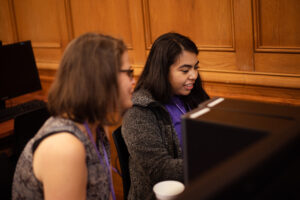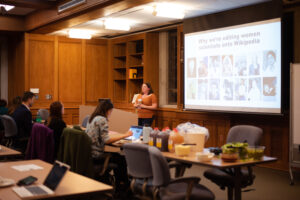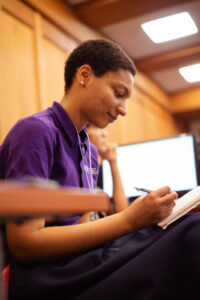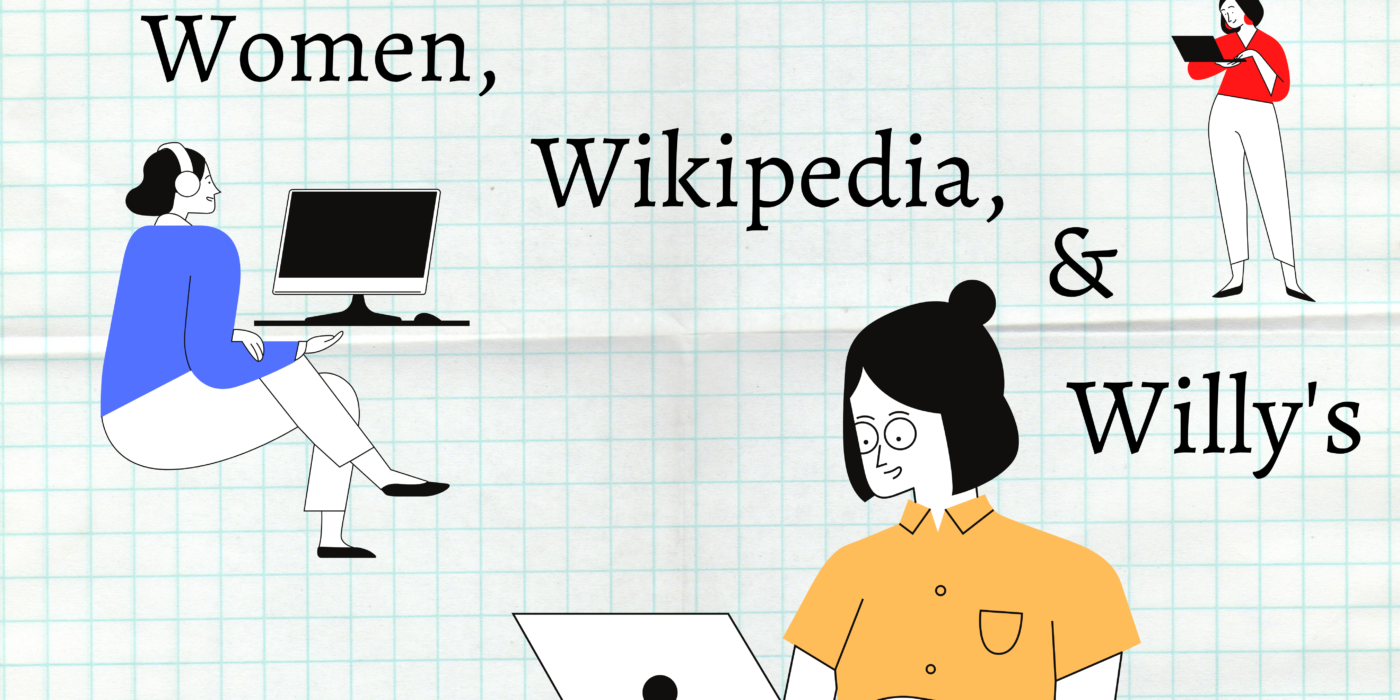“Women, Wikipedia and Willy’s”
“If you’re looking for the nametags, Sophie’s got them.” I had just come up the elevator onto the second floor of the library to see my coworkers huddled around a sign-in table right outside the lecture room when they delivered this unexpected piece of information “Who’s Sophie?”
“She’s a cute little girl, we gave them to her so she would have something to do.”
True enough a little girl with bouncing, brown curls was handing out name tags, albeit with adult supervision. From here I could the rest of the night would be the same, casual and relaxed.
On January 29th, the Association for Women in STEM (AWIS) hosted the ATL Women in STEM Wikipedia Edit-a-thon in Mccain library on Agnes Scott campus.
The Center for Digital and Visual Learning (CDVL), Agnes’ on-campus student software support center, and the library staff had been working together for the last couple of months, preparing for this night. As a tutor for Agnes Scott’s Center for Visual and Digital Literacy (CDVL), it was expected that I, and my other nine coworkers, take various shifts throughout the evening.


To reach the event, you had to take the stairs or elevator up to the second floor of Agnes Scott College’s Mccain library, subsequently reaching a lecture room sequestered away from books and distractions. Upon entering the lecture room, empty tables with outlets provided space for those with personal laptops to work, while in the back of the room, old-fashioned desktops were available for those without. All the computers and tables were situated across from a presentation stand and the projector screen and a good number of people who had arrived early were already scattered around the room. As far as set-ups go, this arrangement is common among edit-a-thons. An edit-a-thon (also spelled editathon) is essentially an event in which people work together in person or online to build or edit content on a wiki page and with the projector overhead, step by step instruction is made easier.
Now, the purpose behind this particular editathon was to increase the visibility of women and women’s accomplishments in STEM in Wikipedia articles. Wikipedia is the 8th most popular website in the world. It gives users free access to millions of encyclopedic articles, which are edited and scrutinized by volunteers, that span a wide range of subjects and genres. It is an indispensable resource with great power, but power, in many ways, is often skewed toward certain individuals. A 2015 survey of contributors to Wikipedia found that less than 15% of contributors were women. Also, there are fewer and less extensive articles about women or topics important to women. Because this is a common criticism of Wikipedia, the article giant has made an ongoing attempt to increase female editorship of Wikipedia. Edit-a-thons are often held to encourage female and other marginalized demographics to become editors and increase the coverage of women’s topics. Therefore, AWIS, created in 1971, is a global network with 80 grassroots chapters and affiliates connecting more than 100,000 professionals in STEM with members, allies and supporters worldwide. According to the organization’s website, on a massive scale, it represents roughly 7.4 million women working in STEM fields. Wikipedia Edit-a-thons are just one of the many ways the AWIS of Georgia chapter seeks out community involvement.
Working in tandem with AWIS at this particular event was the organization 500 Women Scientists. Another grassroots organization, according to its own website, it was formed by four women immediately following the November 2016 election as a non-profit group dedicated to making science inclusive and accessible for marginalized identities in and out of the STEM and field. As well as AWIS, included in their mission, hosting Wikipedia Edit-a-thons is a big initiative among their members.


Before the event could begin, I decided to poll whoever I could find in the room and determine who was a part of which organization, why, and what exactly brought them here. The first person I meet is Jacqueline. Jaqueline, a member of the local Decatur chapter or “pod” of 500 Women Scientists, said she became involved with the organization from following Jess Wade–a British physicist whose goal is to write one Wikipedia entry on a woman scientist a day–on social media. “I follow Jess Wade’s story on Twitter,” she said in a low voice, “and I thought it would be an awesome cause, after all I use Wikipedia almost everyday of my life.”


Another person, named Margo, had recently returned to Georgia and in looking for things to do in Decatur, stumbled across AWIS. “Research is only as good as the source, and Wikipedia is one of the most widespread,” she offered when questioned. She herself follows Josephine Ball’s story. Ball, who was an American psychologist best known as an early pioneer in the study of reproductive behavior and neuroendocrinology, faded into obscurity along with her contributions to science, but was revived thanks to female researchers. Finally I asked Maya Martin, a sophomore attending Agnes Scott and majoring in English, what brought her there. “I saw it on the [school] Calendar,” she said while seated at a desktop, “I’m interested in the idea of increasing [women’s] visibility.” I jot this down and scan the room for other potential interviewees, by this point the room is holding a decent amount of people, when the hosts began to call everyone’s attention to the front. The edit-a-thon was beginning. I sit in the back, listening to the speaker give instructions, knowing that I have zero intention of doing any editing myself. The process of selecting an article, collecting extensive credible resources and then forming it in a manner that adheres to Wikipedia’s very strict editing protocols is the last thing I want to do on a full stomach of Willy’s. After all, I’m mainly here to troubleshoot any issues.
The participants stare intently at their screens while they move Willy’s chips topped with guac and salsa from their plates to their mouths. I eventually begin to make my rounds, looking for anyone to assist, and end up in a conversation with Nicole Barran who heads the local 500 Women scientist pod. When I ask her why this work is important she tells me, “It feels very activist to bring these stories [to light].” “Our role is to increase awareness and expand [the public’s] body of knowledge.” From herein out the rest of the night is pretty laid back, with the occasional question poised here and there. Not as many Agnes students made it to the event as the CDVL and library teams would have liked but the effort was still worthwhile. After the end of the event, I followed up with Maya about her personal experience with the Edit-a-thon by asking her a few questions.
Interview with Maya Martin:
AA: “How much editing did you accomplish and are satisfied with what you accomplished?”
MM: “I didn’t do a ton of editing because I was nervous at first that someone on the Internet would yell at me. I added a movie deal here, a libel suit there. I’m mostly glad that I know how to edit Wikipedia now, because I want to do more work on my own. As I was looking through, I came across a lot of neat initiatives that aim to increase coverage of women, people of color, and physics, etc. on Wikipedia”.
AA: “As a student, do you think learning to edit Wikipedia is a beneficial skill for students and why?”
MM: “For sure. Learning the behind the scenes of Wikipedia helped me realize that it’s more credible than we give it credit for (though I still wouldn’t cite it in an English paper). On prominent sites, there’s thousands of people watching to constantly fact-check and make sure any “vandalism” is quickly undone. People talk to each other in a scholarly way on the “talk” page to discuss what edits should be made. You have to cite everything you claim. You have to disclose conflicts of interest”.
AA: “And finally, did you enjoy the event and would you consider editing Wikipedia again?
MM: “The tofu made me quite happy. I will edit Wikipedia again and I have lots of ideas for what to work on, if I ever have a free minute between all these classes.”

